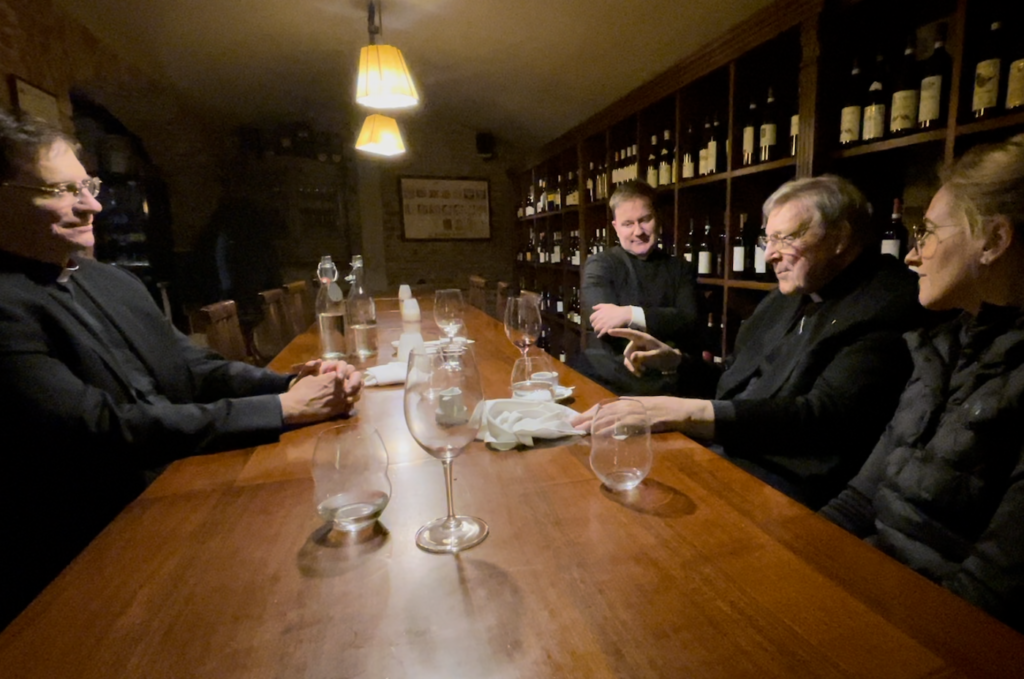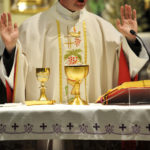Occasionally in life we are presented with opportunities that surprise us—unexpected offers for work, of travel, or the chance to meet someone you never thought you would. This happened to me in 2022, and it was a gift I will treasure for the rest of my days. I was introduced to His Eminence George Cardinal Pell about a year ago, by a mutual friend who had known him for decades. I was seeking advice about organizing a conference on how evidence from the social science of marriage and sexuality reinforces Catholic social teachings on the same, despite popular opinion and a prelate’s claims to the contrary.
The cardinal, trusting his friend’s assessment of me, volunteered to seek a willing host for our first conference, and then did it one better by agreeing to speak at a pair of such events in relatively short order. I was extremely grateful. I offered him the keynote in each, and he didn’t fail to deliver, discussing the legacy of St. John Paul II and the future of Church leadership to a variety of his brother bishops. He seemed to enjoy the time and the many side conversations such events create. An analyst, he relished listening, reading, and talking.
We first met in person only last June at his residence in Rome, an apartment within sight of the Vatican’s colonnade. His next-door neighbor was a dicastery head with whom he had much in common—they were both prelates whose lives had been dedicated to the priesthood and Church administration. But as observers of Church politics know, the similarities can end there. And in their case, they did. Such is Rome. I last saw him in early December, where he treated another small group of leaders to the same talk before diverting to ad lib the basic framework of his criticisms regarding synodality that appeared in print the day after his death. I suspect he submitted them then because of the risk of his death. But they are independent of my own critical assessment of the methodology employed in preparation for the upcoming synod, published two days before. I never asked him about the “Demos” memo. It never even occurred to me to do so.
It was obvious in December that hip surgery was imminent. A fifteen-minute walk back from a parish at which he had been the chief celebrant of the Mass required a half-hour of rest before a cab ride to dinner. I groaned at the thought of the cardinal navigating the steep, narrow stairs down to the wine cellar room where a long table of clergy awaited, but he never once complained. I went in front of him, which didn’t make a great deal of sense. Had a man of his stature fallen on me, we’d have both been in tough shape. I spent much of the evening on the other end of that table, joining him after most of the diners had returned to the hotel. Four of us remained with the cardinal and spent an additional half hour talking about anything and everything, from priestly cassocks to Australian Catholic schools to his role in chairing the Vox Clara committee, whose counsels yielded the changes to the English Mass liturgy we now take for granted. A baby Catholic when the committee’s work came to fruition, I was unaware that he had played such a central role in that effort. I thanked him, reciting a vivid memory of the beauty of the very first collect the day those changes took effect (on November 27, 2011). The adjustments met resistance, of course, but seldom does a week go by when I don’t recognize how much richer our liturgy is today. The cardinal was genuinely pleased to know that the fruit of their committee’s work was remembered and appreciated, and a discussion of it ensued. I snapped a variety of photos and captured some video of him that evening and the next. “You never know,” I recall thinking. I’m glad I did.
Start your day with Public Discourse
Sign up and get our daily essays sent straight to your inbox.We talked about anything and everything, from priestly cassocks to Australian Catholic schools to his role in chairing the Vox Clara committee whose counsels yielded the changes to the English Mass liturgy we now take for granted.
After dinner three months before that December evening, my 21-year-old daughter and I pulled up chairs at the cardinal’s table in another city. The topic turned to his 404 days of incarceration. Ever the data collector, I bluntly asked him if he missed anything about prison. He responded that he did, in fact. He had appreciated the unscheduled time—the freedom, you could almost say, of being incarcerated. Had his unjust conviction not been unanimously overturned, I would never have met him. Pell would have served a sentence lasting until at least November 2022, and perhaps longer. Those who mourn him are grateful that he did not die in prison. The last time we were together, I introduced him to an old widow who had written him on several occasions during his time in jail. She wanted to meet him, since her own husband had spent five years imprisoned for crossing the Communist authorities in her country. Of course he obliged.
When my daughter spoke—I had invited her to offer a few remarks as the sole Gen Z representative at the first conference—he took copious notes. When I interrupted her, the cardinal leaned over and chastened me with a choice word or two, insisting I keep quiet and let her speak. Various portrayals of the cardinal characterize him as ill-tempered at times. Perhaps. I know I irritated him on several occasions. But a man with a good sense of the gospel lives in the freedom and confidence of grace. For Cardinal Pell, it wasn’t personal. His responses, which could be curt and dismissive, reflected his thoughts about what—not who—he was reading, seeing, or hearing. His style is the antithesis of our era, in which passive endorsement of vacuous ideas seems required, as emotions weigh more than evidence.
Despite suggestions to the contrary, Cardinal Pell was a great respecter of the papacy, and did not dislike the character of the current pontiff, even while harboring significant concerns about the recent course of his pontificate. Many have heard him speak at length about Pope Francis’s admirable qualities, actions, and habits, including the latter’s compassion for the poor and suffering, and his imitation of their simple lifestyle. And His Eminence meant it. Pell observed that Francis did not spend holidays away from the Vatican, “because the poor are not able to go away for their holidays.” The cardinal rejected any suggestion that Francis was a closet Marxist or a liberation theologian. As his longtime friend George Weigel recalled, Pell always fought fair.
Despite suggestions to the contrary, Cardinal Pell was a great respecter of the papacy, and did not dislike the character of the current pontiff, even while harboring significant concerns about the recent course of his pontificate.
Rather, the Holy Father followed “the theology of the people,” a central theme of his pontificate and of the upcoming synod. A key to understanding Francis, Pell maintained, was his own words in Evangelii Gaudium (222–237). There, the pope describes four principles that Pell held are “primary and fundamental parameters of reference for interpreting and evaluating social phenomena.” They are: 1. Time is greater than space. 2. Unity prevails over conflict. 3. The whole is greater than the part. 4. Reality is more important than ideas. Pell worried that these four social principles “are not found in the Scriptures, not in the social doctrine of the Church, not in Thomas Aquinas,” nor in other key Catholic interpreters.
Francis’s writings, he maintained, permitted a good many tensions “creative or destructive” to continue, a penchant that may reach a denouement in the upcoming synod, the focus of Pell’s final fears. It is “not beyond the bounds of possibility,” he declared, that a “nightmare endpoint” could be realized through it, one that “degenerates into a loose and unhappy federation” not unlike “the history of the Orthodox Churches and the Anglican communion demonstrate.” In other words, the catholicity, the unity, and the magisterium of the Church seem to be at stake. Is this unnecessarily alarmist? I hope so. I’m not sure it is. Will the Church remain one, holy, Catholic, and apostolic? We are going to find out.
The day His Eminence died, I had mentioned the cardinal’s surgery to a friend. It prompted me to text his secretary about it, anticipating good news. Shortly thereafter, the first rumor found its way to me. Then came the response from his secretary: “He has gone to Jesus.” I’m not an emotional person, but I wept more that afternoon than I anticipated, which surprised and embarrassed me. The general was gone, leaving scores of colonels, majors, sergeants, and at least one lowly private stunned. He was 81, of course, but his mind and voice had been as fertile as ever. Some say he was the “type of prelate that was common throughout the 20th century.” While that seems an overstatement, it is surely the case that they are unheard of in the 21st.
Unlike the cardinal’s dear secretary, Fr. Joseph Hamilton, I am not Irish. But I consider myself lucky to have gotten to know George Cardinal Pell a bit—and that after his 80th year. I comfort myself with the concluding words from the prayer after communion of that very first Advent Sunday that premiered Vox Clara’s labors:
. . . for even now, as we walk amid passing things, you teach us by them to love the things of heaven and hold fast to what endures.
The grass withers, the flowers fade, but the Word of our God that one Australian prelate never failed to profess and proclaim endures forever. Until we meet again, Your Eminence, I will hold fast.













